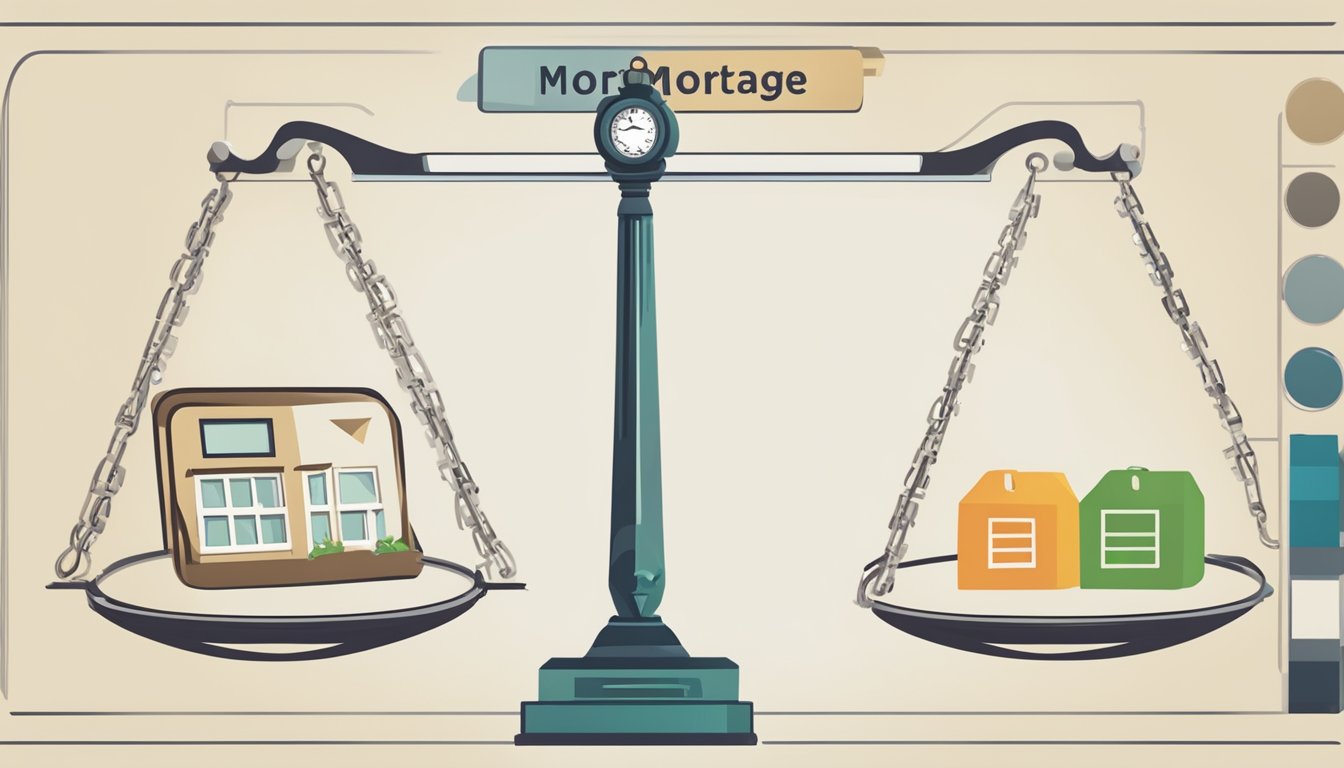If you’re looking to borrow money, you may be wondering which type of loan is best for you: a mortgage loan or a personal loan. While both types of loans can provide you with the funds you need, they are different in several ways. Understanding the differences between mortgage loans and personal loans can help you make an informed decision about which loan is right for you.

Mortgage loans are typically used to purchase a home or other real estate property. They are secured loans, which means that the property you are purchasing serves as collateral for the loan. Mortgage loans generally have lower interest rates than personal loans, and the interest you pay on your mortgage loan may be tax-deductible. However, mortgage loans are also typically much larger than personal loans and require a down payment.
On the other hand, personal loans are unsecured loans that can be used for a variety of purposes, such as consolidating debt or paying for home improvements. Because personal loans are unsecured, they typically have higher interest rates than mortgage loans. However, personal loans may be a good option if you need to borrow a smaller amount of money or if you don’t have collateral to offer.
Key Takeaways
- Mortgage loans are secured loans that are used to purchase real estate, while personal loans are unsecured loans that can be used for a variety of purposes.
- Mortgage loans generally have lower interest rates than personal loans, but they also require a down payment and are typically much larger.
- Personal loans may be a good option if you need to borrow a smaller amount of money or if you don’t have collateral to offer.
Comparing Mortgage Loans and Personal Loans

Fundamental Differences
When it comes to borrowing money, you have two main options: mortgage loans and personal loans. While both are loans, there are fundamental differences between the two.
A mortgage loan is a secured loan that is used to purchase property, such as a house or a flat. The property acts as collateral for the loan, which means that if you default on your repayments, the lender can repossess your property and sell it to recover their money. Mortgage loans typically have lower interest rates than personal loans because they are secured by collateral.
On the other hand, a personal loan is an unsecured loan that can be used for a variety of purposes, such as debt consolidation, home improvements, or a wedding. Because personal loans are unsecured, they typically have higher interest rates than mortgage loans. Personal loans are also for smaller amounts than mortgage loans, making them less suitable for large purchases like a house.
Impact on Financial Health
Both mortgage loans and personal loans can have a significant impact on your financial health. Your credit score, income, and debt-to-income ratio will all be taken into account when you apply for a loan, and these factors will determine whether you are approved for the loan and what interest rate you are offered.
If you default on a mortgage loan, you risk losing your property through foreclosure, which can have a devastating impact on your credit score and your financial health. Personal loans, on the other hand, are unsecured, so there is no collateral to repossess if you default on the loan. However, defaulting on a personal loan can still have a negative impact on your credit score and your ability to borrow money in the future.
In summary, mortgage loans and personal loans are two different types of loans that are used for different purposes. Mortgage loans are secured by collateral and are used to purchase property, while personal loans are unsecured and can be used for a variety of purposes. When deciding between the two, it is important to consider your financial situation and your ability to repay the loan.
Key Considerations for Borrowers

As you consider taking out a loan, it’s important to understand the key differences between a mortgage loan and a personal loan. Here are some key considerations to keep in mind as you navigate the borrowing process.
Choosing the Right Loan for You
When deciding between a mortgage loan and a personal loan, it’s important to consider your needs and financial situation. If you are looking to purchase a property, a mortgage loan may be the right choice for you. Mortgage loans are secured loans, meaning they are backed by the property you are purchasing. This can make them easier to obtain and may result in lower interest rates. However, mortgage loans typically require a down payment and may have other fees and costs associated with them.
If you are looking for a loan for other purposes, such as debt consolidation or home improvements, a personal loan may be a better option. Personal loans are typically unsecured loans, meaning they are not backed by collateral. This can make them more difficult to obtain and may result in higher interest rates. However, personal loans can be used for a variety of purposes and may have more flexible repayment terms.
Navigating Loan Repayment
When taking out a loan, it’s important to understand the repayment terms and requirements. Mortgage loans typically have longer repayment terms, often spanning 15 to 30 years. This can result in lower monthly payments, but may also mean paying more in interest over the life of the loan. Personal loans, on the other hand, typically have shorter repayment terms, often ranging from 1 to 5 years. This can result in higher monthly payments, but may also mean paying less in interest over the life of the loan.
In addition to understanding the repayment terms, it’s important to consider the costs and fees associated with the loan. Mortgage loans may have origination fees, appraisal fees, and other costs associated with them. Personal loans may have origination fees and other fees as well. It’s important to factor in these costs when considering the overall cost of the loan.
When choosing between a mortgage loan and a personal loan, it’s important to consider your debt-to-income ratio and credit score. Mortgage loans typically have stricter approval requirements, and lenders will evaluate your credit score, income, and other factors when deciding whether to approve your application. Personal loans may have more flexible approval requirements, but your credit score and income will still be important factors.
In conclusion, choosing between a mortgage loan and a personal loan requires careful consideration of your financial situation and needs. By understanding the key differences and requirements of each type of loan, you can make an informed decision and choose the loan that is right for you.
Frequently Asked Questions

What are the key differences between a home loan and a personal loan?
When it comes to borrowing money, there are two main options: a home loan and a personal loan. The key difference between these two types of loans is that a home loan is secured against a property, whereas a personal loan is unsecured. This means that if you default on a home loan, the lender can repossess your property to recover their losses, while with a personal loan, the lender has no collateral to fall back on.
How do the interest rates typically compare between mortgage loans and personal loans?
Interest rates for home loans are generally lower than those for personal loans, as the lender is taking on less risk by lending against a property. The interest rate you are offered will depend on a number of factors, including your credit score, the size of your deposit and the amount you wish to borrow.
Can personal loans be used for home improvements, and how do they stack up against mortgages?
Personal loans can be used for a variety of purposes, including home improvements. However, they may not be the best option if you are planning major renovations, as the interest rates are likely to be higher than those for a home loan. Additionally, personal loans typically have shorter repayment terms, which means you will need to make higher monthly repayments.
What are the advantages of choosing a mortgage loan over a personal loan when buying property?
One of the main advantages of choosing a mortgage loan over a personal loan when buying property is that the interest rates are generally lower. Additionally, mortgage loans typically have longer repayment terms, which means you can spread your repayments over a longer period of time and reduce your monthly payments.
Are there any specific circumstances where a personal loan is more beneficial than a mortgage?
Personal loans can be a good option if you need to borrow a smaller amount of money for a shorter period of time. They are also a good option if you do not own a property or do not wish to use your property as collateral.
How does my credit score affect the choice between a mortgage loan and a personal loan?
Your credit score will have a significant impact on the interest rate you are offered for both mortgage loans and personal loans. If you have a good credit score, you are likely to be offered lower interest rates, which can save you money over the life of the loan.




